|
|
|
Sort Order |
|
|
|
Items / Page
|
|
|
|
|
|
|
| Srl | Item |
| 1 |
ID:
098389
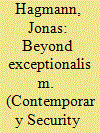

|
|
|
|
|
| Publication |
2010.
|
| Summary/Abstract |
Switzerland's traditional, military-centred and isolationist Cold War policies began to be vehemently contested in the 1990s. However, since the early 2000s, debates on security policy and foreign affairs have gradually lost public salience, and recent popular votes suggest increasingly consistent support both for a broader conception of national security and a more internationalist interpretation of neutrality. Have Switzerland's traditional policy frameworks thus been overcome? Investigating elite positions, this article argues that indeed, conventional disputes between military and civilian understandings of security have been transcended recently, as Swiss policy-makers settled for a remarkably broad and non-traditional conception of national security. At the same time, the article also argues, the perception of increasingly global security challenges has started to provide powerful rationales against traditional Swiss isolationism. By showing the processes through which Swiss security conceptions have been reformulated into a new dominant elite agreement, the article points out how Switzerland has slowly come to embrace security in European terms - not least also thanks to its new focus on non-traditional security agendas.
|
|
|
|
|
|
|
|
|
|
|
|
|
|
|
|
| 2 |
ID:
189270
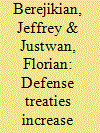

|
|
|
|
|
| Summary/Abstract |
Do security guarantees affect people's willingness to spend their country's “blood and treasure” in a military crisis? Recent research finds that international legal commitments reshape domestic policy preferences. However, the focus of that scholarship is traditionally on issues such as human rights that define a society's normative obligations. In this study, we deploy two original survey experiments in the United States describing a potential military crisis on the Korean peninsula. We find that increasing the salience of the 1953 agreement between Washington and Seoul increases support for military action and that individuals become both more tolerant of U.S. military deaths and North Korean civilian casualties. In addition, the breadth of these effects increases when individuals are provided more detail about the agreement. These results extend the analysis of international law and domestic preferences into the domain of national security politics.
|
|
|
|
|
|
|
|
|
|
|
|
|
|
|
|
| 3 |
ID:
114565
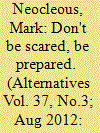

|
|
|
|
|
| Publication |
2012.
|
| Summary/Abstract |
Rather than concerning ourselves with "governing trauma" we should instead be concerned with how trauma has come to govern us. Trauma talk now comes naturally, and the article explores what all this trauma talk might be doing, ideologically and politically, especially in the context of the relationship between security and anxiety. The management of trauma and anxiety has become a way of mediating the demands of an endless security war: a war of security, a war for security, a war through security. The article therefore seeks to understand the concept of trauma and the proliferation of discourses of anxiety as ideological mechanisms deployed for the security crisis of endless war; deployed, that is, as a training in resilience. Trauma is less an issue of memory or the past and more a question of building resilience for the future. The language of trauma and anxiety, and the training in resilience that is associated with these terms, weds us to a deeply conservative mode of thinking.
|
|
|
|
|
|
|
|
|
|
|
|
|
|
|
|
| 4 |
ID:
084697
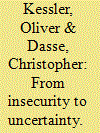

|
|
|
| 5 |
ID:
139495
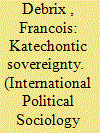

|
|
|
|
|
| Summary/Abstract |
At its core, security is obsessed with the survival of the sovereign order. Security tends to see the sovereign's existence as threatened by agents whose purpose is to challenge the life of the sovereign. In this article, I mobilize a theological language about the relationship between sovereignty and security to grasp the place that the question of life versus death, the fact of sovereign violence, and the problem of temporality occupy in past and present modalities of security. The notion of sovereign restraint, captured by the theological concept of katechon, is introduced to suggest that the politics of security is dependent upon a fundamentally violent, uncompromising, and often terrorizing objective: to keep at bay forces of temporal finitude seen as disorder or chaos. Forces of temporal finitude that refuse to abide by the belief in the sovereign's infinity can be described as the eschaton or as agents of eschatological time. Katechontic sovereignty, the sovereign practice intent on holding off finite ends (and on casting away agents of eschatological “terror”), is generative of security operations that involve decisions over life and death, matters of biopolitics versus necropolitics, and encounters between the ontological vulnerability of the sovereign and “terrorizing” agents.
|
|
|
|
|
|
|
|
|
|
|
|
|
|
|
|
| 6 |
ID:
108486


|
|
|
| 7 |
ID:
168580


|
|
|
|
|
| Summary/Abstract |
In this introduction to the special issue on “Peripheral Visions: Security by, and for, whom?”, we summarise the core themes of the special issue and outline our relational approach to peripheralisation research in security studies. We explain how and why the papers that form part of the special issue address the power geometries that result from, and contour, uneven landscapes of resilience and (in)security. Taking our cue from current scholarship that conceptualises peripheralisation and polarisation as relational socio-spatial processes, we examine how constructions of centrality and peripheralisation unfold in, and underpin, security politics.
|
|
|
|
|
|
|
|
|
|
|
|
|
|
|
|
| 8 |
ID:
123674


|
|
|
|
|
| Publication |
2013.
|
| Summary/Abstract |
Southeast Asia's security politics have arrived at an inflection point, thanks to the renewal of territorial conflicts, deterioration of great power relations and the seeming inability of existing regional institutions to cope with these challenges. More than three decades of relative peace and tranquility, which provided the conditions for rapid economic growth and the development of regional cooperation, appear to be coming to an end. Amid the new strategic uncertainties, there is growing interest in the region in a larger Indian contribution to peace and stability in Southeast Asia. Perceptions of India's rise and its expanding military capabilities have raised hopes within the region for a stronger Indian security profile in Southeast Asia. Within India too there is much greater awareness of the changing security politics in East and Southeast Asia and the rare opportunities that present themselves for raising India's standing in the region and the world.
|
|
|
|
|
|
|
|
|
|
|
|
|
|
|
|
|
|
|
|
|